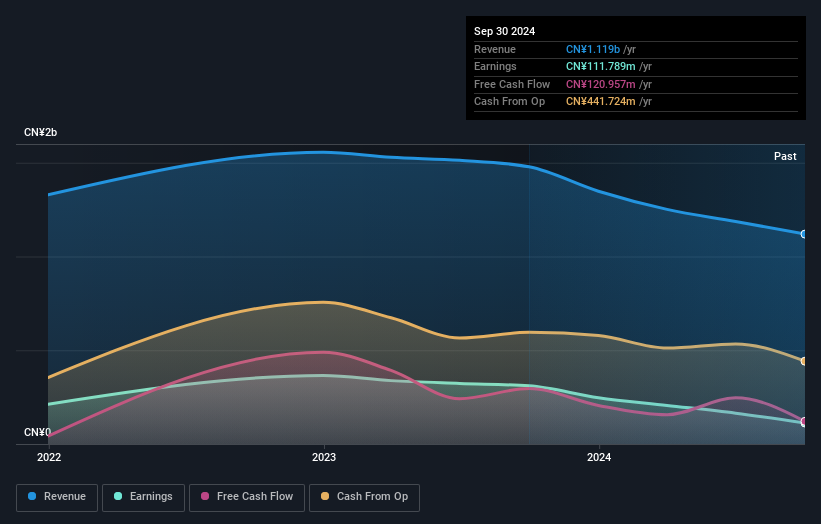Key Insights
- Wafer Works (Shanghai)’s significant private companies ownership suggests that the key decisions are influenced by shareholders from the larger public
- 78% of the business is held by the top 2 shareholders
- Past performance of a company along with ownership data serve to give a strong idea about prospects for a business
A look at the shareholders of Wafer Works (Shanghai) Co., Ltd. (SHSE:688584) can tell us which group is most powerful. With 49% stake, private companies possess the maximum shares in the company. In other words, the group stands to gain the most (or lose the most) from their investment into the company.
Private equity firms, on the other hand, account for 30% of the company’s stockholders.
Let’s delve deeper into each type of owner of Wafer Works (Shanghai), beginning with the chart below.
View our latest analysis for Wafer Works (Shanghai)
What Does The Institutional Ownership Tell Us About Wafer Works (Shanghai)?
Institutions typically measure themselves against a benchmark when reporting to their own investors, so they often become more enthusiastic about a stock once it’s included in a major index. We would expect most companies to have some institutions on the register, especially if they are growing.
We can see that Wafer Works (Shanghai) does have institutional investors; and they hold a good portion of the company’s stock. This implies the analysts working for those institutions have looked at the stock and they like it. But just like anyone else, they could be wrong. It is not uncommon to see a big share price drop if two large institutional investors try to sell out of a stock at the same time. So it is worth checking the past earnings trajectory of Wafer Works (Shanghai), (below). Of course, keep in mind that there are other factors to consider, too.

We note that hedge funds don’t have a meaningful investment in Wafer Works (Shanghai). Silicon Technology Investment (Cayman) Corp. is currently the largest shareholder, with 48% of shares outstanding. In comparison, the second and third largest shareholders hold about 30% and 3.2% of the stock.
After doing some more digging, we found that the top 2 shareholders collectively control more than half of the company’s shares, implying that they have considerable power to influence the company’s decisions.
While studying institutional ownership for a company can add value to your research, it is also a good practice to research analyst recommendations to get a deeper understand of a stock’s expected performance. We’re not picking up on any analyst coverage of the stock at the moment, so the company is unlikely to be widely held.
Insider Ownership Of Wafer Works (Shanghai)
While the precise definition of an insider can be subjective, almost everyone considers board members to be insiders. Management ultimately answers to the board. However, it is not uncommon for managers to be executive board members, especially if they are a founder or the CEO.
I generally consider insider ownership to be a good thing. However, on some occasions it makes it more difficult for other shareholders to hold the board accountable for decisions.
Our information suggests that Wafer Works (Shanghai) Co., Ltd. insiders own under 1% of the company. However, it’s possible that insiders might have an indirect interest through a more complex structure. It is a pretty big company, so it would be possible for board members to own a meaningful interest in the company, without owning much of a proportional interest. In this case, they own around CN¥18m worth of shares (at current prices). It is good to see board members owning shares, but it might be worth checking if those insiders have been buying.
General Public Ownership
With a 13% ownership, the general public, mostly comprising of individual investors, have some degree of sway over Wafer Works (Shanghai). This size of ownership, while considerable, may not be enough to change company policy if the decision is not in sync with other large shareholders.
Private Equity Ownership
With a stake of 30%, private equity firms could influence the Wafer Works (Shanghai) board. Sometimes we see private equity stick around for the long term, but generally speaking they have a shorter investment horizon and — as the name suggests — don’t invest in public companies much. After some time they may look to sell and redeploy capital elsewhere.
Private Company Ownership
Our data indicates that Private Companies hold 49%, of the company’s shares. It might be worth looking deeper into this. If related parties, such as insiders, have an interest in one of these private companies, that should be disclosed in the annual report. Private companies may also have a strategic interest in the company.
Next Steps:
It’s always worth thinking about the different groups who own shares in a company. But to understand Wafer Works (Shanghai) better, we need to consider many other factors. Case in point: We’ve spotted 4 warning signs for Wafer Works (Shanghai) you should be aware of, and 2 of them are potentially serious.
Of course this may not be the best stock to buy. So take a peek at this free free list of interesting companies.
NB: Figures in this article are calculated using data from the last twelve months, which refer to the 12-month period ending on the last date of the month the financial statement is dated. This may not be consistent with full year annual report figures.
Valuation is complex, but we’re here to simplify it.
Discover if Wafer Works (Shanghai) might be undervalued or overvalued with our detailed analysis, featuring fair value estimates, potential risks, dividends, insider trades, and its financial condition.
Access Free Analysis
Have feedback on this article? Concerned about the content? Get in touch with us directly. Alternatively, email editorial-team (at) simplywallst.com.
This article by Simply Wall St is general in nature. We provide commentary based on historical data and analyst forecasts only using an unbiased methodology and our articles are not intended to be financial advice. It does not constitute a recommendation to buy or sell any stock, and does not take account of your objectives, or your financial situation. We aim to bring you long-term focused analysis driven by fundamental data. Note that our analysis may not factor in the latest price-sensitive company announcements or qualitative material. Simply Wall St has no position in any stocks mentioned.




